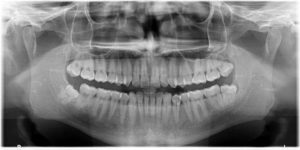What is a wisdom tooth?
A Wisdom tooth is named as such as it appears when you are an adult (and hence wiser). Another name for them is the third molars. These are the last set of molars at the back of your mouth (if present). They vary greatly in shape and size from person to person and are also one of the most commonly missing teeth.
Why are they extracted (removed)?
 Most patients do not have sufficient space for their wisdom teeth to come through. In some cases, the wisdom teeth are stuck below the gum and do not cause any trouble. However, in other cases, they can break through the gum halfway, but are unable to come out all the way due to the lack of space or poor angulation. In such cases, food and bacteria can get trapped under the gum, on the tooth, possibly causing tooth decay or infected or inflamed gums. This chronic infection/inflammation can cause bouts of pain every few months.
Most patients do not have sufficient space for their wisdom teeth to come through. In some cases, the wisdom teeth are stuck below the gum and do not cause any trouble. However, in other cases, they can break through the gum halfway, but are unable to come out all the way due to the lack of space or poor angulation. In such cases, food and bacteria can get trapped under the gum, on the tooth, possibly causing tooth decay or infected or inflamed gums. This chronic infection/inflammation can cause bouts of pain every few months.
In some cases, the tooth decay can ‘spread’ to the neighbouring tooth due to the angulation and amount of food/bacteria getting stuck under the gum. Some patients also experience a great deal of pressure pain from the wisdom teeth. In such cases, if they are causing a bit of trouble, that is usually an indication to remove them.
How do I know if I need them out?
The best way to find out is to discuss any problems with your wisdom teeth with your dentist. If we suspect there is a problem or if we suspect there may be a future problem, we will take a special X-ray (OPG) of your teeth to assess the size, shape, location and angle of your wisdom teeth.
Where do I remove my wisdom tooth?

There are two ways we can remove your wisdom teeth. Firstly, we can do it at our practice, under a local anaesthetic. This is the cheapest and easiest option for most patients (especially if they only have one or two wisdom teeth to remove).
Secondly, if you would prefer to be sedated (sleeping) during the procedure, we can organise a specialist anaesthetist to come to our practice or we can see you at the local hospital. This is usually the preferred method if you have all 4 wisdom teeth to remove however it requires a bit of planning and someone to drop and to pick you up.
The other option is if you prefer to see a specialist oral surgeon for your extractions. This can be organised by us as well. There are some complicated extractions that may need to be done by the oral surgeon.
Alternatives to wisdom teeth removal include no treatment (with worsening of symptoms) and tooth fillings, if the wisdom tooth has a small amount of decay.
Are there any complications?
As with any procedure, some patients can experience complications.
Nerve damage is the biggest risk when removing lower wisdom teeth. This is due to the fact the lower wisdom teeth are situated extremely close to the lower dental alveolar nerve. Removal of the wisdom teeth may exert pressure on this nerve, bruising it, causing temporary or permanent problems including: tingling sensation, paraesthesia (altered nerve sensation), pain, loss of sensation. In severe cases the nerve may be severed. If there is a high risk of this happening, we may recommend referral to an Oral Surgeon instead.
Upper wisdom teeth can also have complications. In some rare cases, the bone behind the upper wisdom teeth (tuberosity) may fracture during the extraction and may need to be stitched back. The sinus is quite close to the roots of the upper wisdom teeth. Sometimes a root can get “sucked up” into the sinus and require retrieval by a specialist. There is a risk of sinus exposure which requires suturing of the gums to close the exposure. If it is a large exposure- you will have to see the specialist oral surgeon to surgically close it up.
As with all extractions, you may experience bruising, pain, swelling, post-operative bleeding and general nausea after the extraction is completed. If a small part of a wisdom tooth root fractures, we may elect to leave it in the mouth because retrieving it would risk damage to vital structures. Find out more about possible complications for tooth removals here.
Interested in Wisdom Tooth removal?
Contact us now on (03) 8899 6331 or check out our other services here.
Book Online
Need help with your dental payments?
We have a variety of Payment Plans available – giving you the flexibility of paying for your Wisdom tooth extraction later.
Payment PlansFrequently Asked Questions
- How much does a wisdom tooth extraction cost?
- Wisdom teeth removal can cost anywhere from a basic extraction cost ($200) to a complex extraction cost (more than $500). This highly depends on the complexity of treatment.
- Do you need to to refer me to a specialist to remove my wisdom tooth?
- Occasionally we need to refer our patients to an Oral Surgeon if the risks of removal are too high. Higher risk procedures include nerve complications or complex medical history.
- Will Wisdom Tooth pain improve with time?
- Generally speaking, if you’ve had pain with your wisdom tooth before, you may get it again and again until it is removed!

